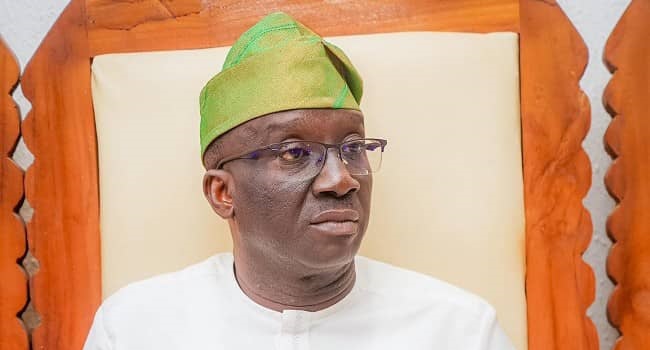Edo State Governor, Monday Okpebholo, has strongly rejected allegations that he was handpicked by political godfathers to serve as a remote-controlled figurehead in the South-South state. Speaking on Channels Television’s Politics Today programme, the governor dismissed such claims, asserting that his rise to power was divinely orchestrated through the support of certain individuals rather than the influence of manipulative political patrons.
When asked about his political lineage and whether specific godfathers had paved his way to office, Okpebholo responded with clarity: “Can you even point out one godfather who was pushing me?” He emphasized that it was Almighty God who used people to assist him in achieving his ambition to lead Edo State. This statement underscores his belief that divine providence played a pivotal role in his journey, rather than any form of coercion or puppetry from powerful figures.
In discussing key supporters during his campaign, Okpebholo highlighted the backing he received from Senate President Godswill Akpabio, who serves as the leader of the ruling All Progressives Congress (APC) in the South-South region. According to the governor, Akpabio’s actions were motivated by a desire for the progress of Edo State and its repositioning on the national stage.
Okpebholo recalled the challenges faced during his senatorial race, noting that despite significant odds against him, he emerged victorious. His confidence in replicating this success in future elections is evident in his declaration: “Even in the next 20 years, I will win.” This assertion reflects not only his self-assurance but also his perception of widespread public support driven by a hunger for change among the people of Edo State.
The governor further addressed claims regarding opposition within the state, suggesting that much of it lacks genuine substance. He revealed that many members of the opposition secretly supported him due to their personal interests, casting doubt on the authenticity of their criticism. “Many of them know the truth, and many of them secretly even voted for me while they were still in PDP because of what they would get from Obaseki; they were not interested in [his government],” he stated.
This revelation paints a complex picture of the political landscape in Edo State, where allegiances may be more fluid than publicly acknowledged. It highlights the intricate web of relationships and motivations underlying local politics.
Another notable aspect of Okpebholo’s interview was his defense of Edo North Senator Adams Oshiomhole, whom some critics have labeled a dictator. Contrary to these accusations, Okpebholo described Oshiomhole as someone who grants him considerable autonomy in managing the affairs of the state. “Even the man that they say is a dictator is not dictating anything; I am seeing a different Oshiomhole,” he remarked.
The governor recounted instances where Oshiomhole offered guidance without imposing restrictions, emphasizing the value of seeking advice while maintaining independence. “Whenever I want to talk to him, he will say: ‘My son, I know how you feel, just do it your way.’ But I will say: ‘Sir, I won’t do it in my way, please advise me,’ and he advises me, and most of the advice comes out to be something positive.”
This interaction suggests a collaborative dynamic between the two leaders, rooted in mutual respect and shared goals for the development of Edo State. Okpebholo stressed the importance of inclusivity in governance, acknowledging that no leader can operate effectively in isolation.
Okpebholo’s path to becoming governor was far from straightforward. As the APC candidate, he triumphed over formidable opponents, including Asue Ighodalo of the Peoples Democratic Party (PDP) and Olumide Akpata of the Labour Party (LP). His victory came after eight years under the leadership of PDP governor Godwin Obaseki, whose tenure ended on November 12, 2024.
A critical factor in Okpebholo’s success was his strategic alliance with influential figures like Dennis Idahosa, his running mate and a former federal lawmaker, and Philip Shaibu, Obaseki’s estranged former deputy. These partnerships strengthened his campaign and helped counterbalance the influence wielded by Obaseki, who campaigned vigorously for Ighodalo.
The APC had previously lost control of Edo State in 2020 when Obaseki defected to the PDP amidst internal party disputes with his predecessor, Adams Oshiomhole. Denied the APC governorship ticket, Obaseki successfully contested under the PDP banner, defeating then-APC candidate Osagie Ize-Iyamu to secure a second term. However, Okpebholo’s victory marked a return to power for the APC, bolstered significantly by Oshiomhole’s active involvement in the campaign trail.
As Edo State embarks on a new chapter under Governor Okpebholo’s leadership, several challenges lie ahead. The administration must focus on delivering tangible results to address the needs and aspirations of its citizens. Key priorities include improving infrastructure, enhancing healthcare services, promoting education, and fostering economic growth.
Okpebholo’s emphasis on collaboration, both within his party and across stakeholders, bodes well for the state’s future. By leveraging the expertise and experience of seasoned politicians like Adams Oshiomhole while maintaining independent decision-making, he aims to chart a course of inclusive and sustainable development.
His dismissal of claims of being a puppet leader sends a strong message to skeptics, reinforcing his commitment to leading authentically and responsibly. For the people of Edo State, this stance offers hope that their new governor will prioritize their welfare above all else.
Governor Monday Okpebholo’s ascent to power represents more than just a political victory—it symbolizes resilience, determination, and faith in divine intervention. As he navigates the complexities of governance, his ability to balance pragmatism with principle will define his legacy and shape the trajectory of Edo State in the years to come.



